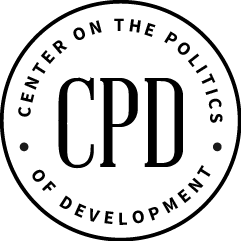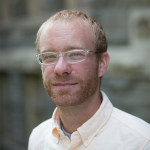Leonardo R. Arriola is Associate Professor of Political Science at the University of California, Berkeley. His research focuses on the political economy of democracy and political violence in developing countries. He is author of Multiethnic Coalitions in Africa: Business Financing of Opposition Election Campaigns (Cambridge University Press), which received a best book award from the African Politics Conference Group, an organized section of the American Political Science Association and the African Studies Association. He has conducted fieldwork in Cameroon, Ethiopia, Kenya, Madagascar, and Senegal. His research has appeared in journals such as the American Journal of Political Science, Comparative Political Studies, and World Politics.
Jennifer Bussell studies comparative politics with an emphasis on the political economy of development and governance, principally in South Asia and Africa. Her research considers the effects of formal and informal institutions—such as corruption, coalition politics, and federalism—on policy outcomes. Her book Corruption and Reform In India: Public Services in the Digital Age (Cambridge University Press) examines the role of corrupt practices in shaping government adoption of information technology across sub-national regions and is based on fieldwork in sixteen Indian states, as well as parts of South Africa and Brazil. Her current research uses elite and citizen surveys, interviews, and experiments to further explore the dynamics of corruption and citizen-state relations as they relate to public service delivery in democratic states. She also studies the politics of disaster preparedness policies in developing countries. Jennifer received her Ph.D. in Political Science from the University of California, Berkeley and prior to returning to Berkeley taught in the LBJ School of Public Affairs at the University of Texas, Austin.
Pradeep Chhibber is a Professor of Political Science and Director of the Institute of International Studies at the University of California, Berkeley. He is currently pursuing two research projects. The first focuses on the influence of religious practice on perceptions of political representation. The second examines governance from the perspective of the citizen. Pradeep received his Ph.D. from UCLA, and his M.A. and M.Phil. from the University of Delhi. He has authored and co-authored several books including The Formation of National Party Systems: Federalism and Party Competition in Britain, Canada and the U.S. with Ken Kollman, and Democracy without Associations: Transformation of Party Systems and Social Cleavages in India, both of which have won Leon Epstein Awards for best book published in the field of political parties and organizations. Pradeep also holds the Indo-American Community Chair in India Studies and the Class of 1959 Chair at the UC Berkeley campus.
Ernesto Dal Bó is the Phillips Girgich Associate Professor of Business and Director of the Berkeley Center for Political Economy at the University of California, Berkeley. His research focuses on phenomena that affect governance, such as political influence, social conflict, corruption, morality and social norms, state formation and the development of state capabilities, as well as the qualities and behavior of politicians and public servants.
 Thad Dunning
Thad Dunning
Thad Dunning is Robson Professor of Political Science at the University of California, Berkeley and serves as the Director of the Center on the Politics of Development. He studies comparative politics, political economy, and methodology; and his current work on ethnic and other cleavages draws on field and natural experiments and qualitative fieldwork in Latin America, India, and Africa. Before returning to Berkeley, where he received a Ph.D. in Political Science and an M.A. in Economics, he was Professor of Political Science at Yale University.
Thad has authored and co-authored several books including Crude Democracy: Natural Resource Wealth and Political Regimes (2008, Cambridge University Press), which won the Best Book Award from the Comparative Democratization Section of the American Political Science Association; Natural Experiments in the Social Sciences: A Design-Based Approach (2012, Cambridge University Press), which was co-winner of the Best Book Award from the Experimental Research Section of APSA; and Brokers, Voters, and Clientelism: The Puzzle of Distributive Politics (2013, Cambridge University Press) with Susan Stokes, Marcelo Nazareno, and Valeria Brusco. His articles have appeared in leading journals, including the American Political Science Review, Comparative Political Studies, International Organization, Political Analysis, and others.
Frederico Finan is an Associate Professor of Economics and Political Economy at the University of California, Berkeley. His research focuses on a broad range of economic topics in the areas of economic development and political economy, with a regional focus on Latin America. Ongoing projects include examining the effects of financial incentives on politicians’ performance and understanding the role of social preferences on voting behavior. He has a Ph.D in Agriculture and Resource Economics from UC Berkeley. Frederico is also an affiliate of the Bureau for Research and Economic Analysis of Development (BREAD), and a research fellow at IZA and the National Bureau of Economic Research (NBER).
Elvin Geng (MD, MPH) is Assistant Professor of Medicine at the University of California at San Francisco (UCSF). Dr. Geng’s research uses the lens of Implementation Science to understand and optimize the uptake of clinically efficacious interventions for HIV into routine care in resource limited settings. Specific projects address engagement and retention in HIV care, improving antiretroviral therapy initiation, adaptive strategies for retention, and evaluating decentralized and communitybased models of care. His work is based in the United States as well as in Uganda, Kenya, Zambia and Zimbabwe. He maintains a primary care panel for HIV infected patients at the Ward 86 Clinic at San Francisco General Hospital. He has previously participated in and presented research at meetings convened by the World Health Organization’s HIV Department including the meeting of the Operations Guideline Committee for Use of Antiretroviral Drugs (2012) and Third Expert Consultation on the Strategic Use of Antiretrovirals focused on Implementation Science (2014).
Susan Hyde is a Professor of Political Science at the University of California, Berkeley. She is an expert on international election observation, election fraud, and democracy promotion. She has served as an international election observer all over the world, and she has worked with the Carter Center, the National Democratic Institute, Democracy International, the International Republican Institute, and the International Foundation for Electoral Systems on democracy promotion issues and researching how democracy promoting organizations can evaluate the effects of their work. In cooperation with the Carter Center, she has piloted methods for introducing the random assignment of short term election observers to the deployment plans used by international observers. At Yale, she is a resident fellow at the Institution for Social and Policy Studies (ISPS), and is a faculty affiliate of the MacMillan Center and the Jackson Institute for Global Affairs. She earned her Ph.D. from the University of California, San Diego in 2006.
Dorothy Kronick is a political scientist focused on contemporary Latin American politics, especially Venezuelan politics. Her work on crime and policing in the Americas highlights unintended consequences of common policies such as seizing illegal drugs or rewriting criminal procedure codes. She also studies democratic backsliding and competitive authoritarianism. Kronick’s work has been published or is forthcoming in the American Political Science Review, the Journal of Politics, International Organization, Political Science Research and Methods, the Quarterly Journal of Political Science, and the Journal of Conflict Resolution, among other outlets. Her commentary on Venezuelan politics has been published in the New York Times and the Washington Post. She holds a Ph.D. in Political Science and an M.A. in Economics from Stanford University. Prior to joining the Goldman School, she taught at the University of Pennsylvania.
Andrew Little is an Assistant Professor of Political Science at UC Berkeley. His research uses formal models to study authoritarian politics, communication and information manipulation, and conflict. Some recent and ongoing projects include models of how elections affect the patterns of political violence over time, how communication technology affects citizens ability to coordinate on anti-regime action, and why politicians lie more than would be most effective at shifting beliefs. He received a B.A. from Carleton College and a Ph.D from NYU.
Aila Matanock is an Assistant Professor of Political Science at the University of California, Berkeley. Her research interests include international engagement during and after civil conflict, post-conflict peace-building, state-building, and development, governance by non-state actors, social support for armed state, non-state, and international actors, especially in Latin America, and survey experiments and multi-method research design. She has a Ph.D. and M.A. in Political Science from Stanford University and an A.B. in Social Studies from Harvard University. Aila is the author of “Governance Delegation Agreements: Shared Sovereignty as a Substitute for Limited Statehood” (forthcoming, Governance). Her doctoral dissertation, “International Insurance: Why Militant Groups and Governments Compete with Ballots Instead of Bullets,” was awarded the 2013 Helen Dwight Reid award from the American Political Science Association for the best dissertation in the field of international relations, law, and politics. Previously, Aila was a postdoctoral scholar at the Institute on Global Conflict and Cooperation (IGCC) at the University of California, San Diego.
Michaela Mattes is an Associate Professor of Political Science at the University of California, Berkeley. Michaela’s research lies at the intersection of international conflict and cooperation. She focuses on two related sets of questions. First, she studies the design and effects of security institutions, such as conflict management agreements and military alliances, in order to understand which types of agreements work, why they are effective, when they are more or less likely to succeed, and why they are designed the way they are. Second, she examines the role of domestic politics in countries’ foreign policy behavior and especially their willingness and ability to pursue international cooperation. She was a Co-PI on an NSF-funded data collection project on changes in leaders’ domestic supporting coalitions and is currently a Co-PI on a DoD Minerva-funded project on domestic security institutions. Her work has appeared in American Journal of Political Science, International Organization, Journal of Politics, International Studies Quarterly, Journal of Conflict Resolution, Journal of Peace Research, and Conflict Management and Peace Science.
Edward Miguel is the Oxfam Professor in Environmental and Resource Economics and Faculty Director of the Center for Effective Global Action at the University of California, Berkeley, where he has taught since 2000. He earned S.B. degrees in both Economics and Mathematics from MIT, received a Ph.D. in Economics from Harvard University, where he was a National Science Foundation Fellow, and has been a visiting professor at Princeton University and Stanford University.
Ted’s main research focus is African economic development, including work on the economic causes and consequences of violence; the impact of ethnic divisions on local collective action; and interactions between health, education, environment, and productivity for the poor. He has conducted field work in Kenya, Sierra Leone, Tanzania, and India. Ted is a Faculty Research Associate of the National Bureau of Economic Research, Associate Editor of the Quarterly Journal of Economics and Journal of Development Economics, recipient of the 2005 Alfred P. Sloan Fellowship, and winner of the 2005 Kenneth J. Arrow Prize awarded annually by the International Health Economics Association for the Best Paper in Health Economics.
Ted is a recipient of the 2012 UC Berkeley campus-wide Distinguished Teaching Award, the Best Graduate Adviser Award in the Berkeley Economics Department, and has served on over 65 completed doctoral dissertation committees.
He has written two books, Africa’s Turn? (MIT Press 2009), and, with Ray Fisman, Economic Gangsters: Corruption, Violence and the Poverty of Nations (Princeton University Press 2008). Economic Gangsters has been translated into ten languages, and the New York Times’ Nicholas Kristof praises it as “smart and eminently readable”. Miguel’s other writing has appeared in Foreign Affairs, Forbes, and the New York Times.
Cecilia Hyunjung Mo joined University of California, Berkeley as an Assistant Professor of Political Science with a courtesy appointment at the Goldman School of Public Policy in 2018. She was previously an Assistant Professor in the Department of Political Science at Vanderbilt University.
She specializes in behavioral political economy, comparative political behavior, the political economy of development, and social policy research. She focuses on significant contemporary challenges to development and moral issues of today like cultivating democratic citizenship, understanding and addressing the negative consequences of rising inequality, combatting modern day slavery, and reducing prejudice. Her research agenda is interdisciplinary and lies at the intersection of political science, economics, and psychology.
Cecilia has published research in the American Journal of Political Science, the American Political Science Review, the Journal of Politics, the Journal of Theoretical Politics, Political Behavior, the Proceedings of the National Academy of Sciences, and World Development. She is the recipient of the American Political Science Association (APSA)’s 2015 Franklin L. Burdette/Pi Sigma Alpha Award for the best paper presented at the previous year’s annual meeting and the 2016 Best Article in Political Behavior award from APSA’s Elections, Public Opinion and Voting Behavior Section. She has also been awarded over $1.6 million grant dollars to support her research agenda in the last three years.
Maya Petersen is an Assistant Professor of Biostatistics and Epidemiology in the University of California, Berkeley School of Public Health. She received her PhD in biostatistics from UC Berkeley in 2007 and her MD from UCSF in 2009.
Her methodological work focuses on causal inference methods, the integration of machine learning and statistical inference, and the design and analysis of cluster randomized trials. Her applied work focuses on developing and evaluating improved HIV prevention and care strategies in resource-limited settings.
Alison Post is an Associate Professor of Political Science and Global Metropolitan Studies, and Co-Director of the Global Metropolitan Studies Program. Her research lies at the intersection of comparative urban politics and comparative political economy, with regional emphases on Latin America and South Asia. It examines several related themes: the politics of regulating privatized infrastructure, the varying ability of subnational governments to provide infrastructure services effectively following the decentralization wave of the 1990s, and the politics of urban policy more broadly. She is the author of Foreign and Domestic Investment in Argentina: The Politics of Privatized Infrastructure(Cambridge University Press, 2014) and articles in Comparative Politics, Governance, Perspectives on Politics, Politics & Society, Studies in Comparative International Development, World Development, and other outlets. She has been named a Clarence Stone Scholar (an early career award) by the Urban Politics Section of the American Political Science Association, and received U.C. Berkeley’s Carol D. Soc award for mentoring graduate students. Her doctoral dissertation, “Liquid Assets and Fluid Contracts: Explaining the Uneven Effects of Water and Sanitation Privatization,” won the 2009 William Anderson award from the American Political Science Association for the best dissertation in the general field of federalism, intergovernmental relations, state or local politics. She has served as a a Marshall Scholar, a postdoctoral research scholar with the Committee on Global Thought at Columbia University, a Visiting Researcher at the Centro de Estudios de Estado y Sociedad in Buenos Aires and the U.N. Economic Commission for Latin America and the Caribbean (E.C.L.A.C.) in Santiago, and as a Researcher at L.S.E. Urban Research in London.
Scott Straus (Ph.D. Berkeley, 2004) is a Professor of Political Science who studies political violence, genocide, human rights, and post-conflict politics with an empirical focus on Sub-Saharan Africa. He is the author or editor of nine books, including Making and Unmaking Nations: War, Leadership, and Genocide in Modern Africa (Cornell, 2015), which won the Grawemeyer Award for Improving World Order, the Lepgold Prize from Georgetown University, the Best Book in Conflict Processes from the American Political Science Association, and the Best Book in Human Rights from the International Studies Association. Straus also wrote The Order of Genocide: Race, Power, and War (Cornell, 2006), which won the Best Book in Political Science from the Association of American Publishers and Honorable Mention for the Melville Herskovits prize from the African Studies Association. He also authored Fundamentals of Genocide and Mass Atrocity Prevention (US Holocaust Memorial Museum, 2016) and co-authored, with Barry Driscoll, Introduction to International Studies: Global Forces, Interactions, and Tensions (Sage, 2022, 2nd ed.) Straus has published articles in American Journal of Political Science, World Politics, Politics and Society, Foreign Affairs, Perspectives on Politics, African Affairs, Journal of Peace Research, Terrorism and Political Violence, Genocide Studies and Prevention, The Journal of Genocide Research, and other journals. Straus also serves as the co-editor, with Michel Wieviorka, of the Paris-based journal Violence: An International Journal and of the Critical Human Rights book series at the University of Wisconsin Press, alongside Tyrell Haberkorn. He has received fellowships from the Harry Frank Guggenheim Foundation, the Andrew Mellon Foundation, the National Science Foundation, the Social Science Research Council, and the United States Institute of Peace. Prior to returning to Berkeley in 2021, he was the Vilas Distinguished Achievement Professor of Political Science and International Studies, where he also served as Chair and Associate Chair of the Department of Political Science and won the campus-wide William Kiekhofer Distinguished Teaching Award. In 2016, President Obama appointed him to the Council of the U.S. Holocaust Memorial Museum, and Straus continues to serve on the Museum’s Committee on Conscience. Prior to his academic career, Straus was a freelance journalist based in Nairobi; he was nominated for a Pulitzer Prize for his 1996 coverage of the war in the Democratic Republic of Congo.
Martha Wilfahrt is an Assistant Professor of Political Science at the University of California, Berkeley. She studies African Politics and political economy of development, with a focus on redistributive politics and historical legacies. Her current research revolves around two themes. The first focuses on historical legacies in contemporary African politics, with a particular interest in the persistence of social norms from the precolonial and colonial era. Martha has conducted original field research for these projects in Ghana, Togo and Senegal. A second stream of work examines the politics of field research in the Global South. This research agenda includes joint work on the experiences of survey enumerators during data collection and a new book project on participant experiences during field experiments. Martha is the author of Precolonial Legacies in Postcolonial Politics (Cambridge University Press, 2021) and articles in Comparative Politics, the Quarterly Journal of Political Science, World Development and World Politics. She received her PhD from Cornell University.


















